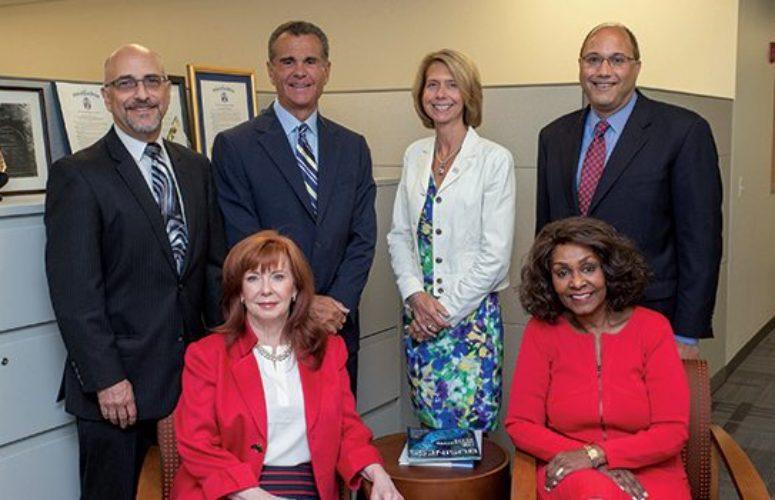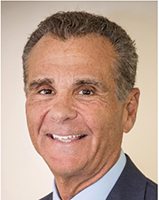
Delivering Help to Small Businesses Roundtable
This month, New Jersey Business magazine’s quarterly Trade-Talk Roundtable series focuses on the organizations that provide small business assistance in the state.
By Anthony Birritteri, Editor-in-Chief On Oct 12, 2015Everyone knows the phrase “Small businesses are the backbone of the economy,” but this backbone itself is supported by a vast array of public- and private-sector organizations that breathe life into entrepreneurial dreams. In this next Trade-talk Roundtable installment, leaders from six of these organizations discuss the issues they face in helping small businesses.
How do these organizations differ from one another in terms of services delivered, and what new assistance programs are they offering? Additionally, what are the challenges entrepreneurs face in terms of financing, finding skilled employees, procuring government contracts and other matters?
These and other questions are answered in an in-depth Q&A that follows the participant biographies below:






Q: What are some of the issues you face when telling start-ups and existing small businesses about your services and the fact that your organizations are there to help them?
Titone: For the Small Business Administration (SBA), it’s the problem we have faced for quite a while, and that is the fact that we can’t use federal dollars to market or advertise. So, many small businesses learn about us through word of mouth from our partners, many of whom are here at this table.
Tinen: I have to echo that. We are a nonprofit that serves the state, and we provide financing, training and government procurement assistance to small businesses. Because we are primarily state and federally funded, we cannot utilize those dollars for marketing.
Additionally, there is a certain amount of skepticism when we say, “I am here from the ‘quasi-government’ to help you.” That usually isn’t a good starting point. People are pleasantly surprised when they do come in, and we hear them say, “‘Oh, Yes … real, qualified professionals are here to help us.’”
Cozza: SCORE is a nationwide organization, part of the SBA, with about 15,000 members nationwide. We have former senior executives from a variety of industries providing counseling. The biggest challenge we have is also awareness. When I meet with SCORE clients, they are more likely to have just stumbled upon us. Because our services are free to the small business owner, you would think this would be a significant motivator for them.
Hopper: We also can’t market, but surprisingly enough, we really don’t have issues with finding clients. It’s due to that great word of mouth that Al mentioned. When you help someone and they are satisfied, they will talk about your services. It is also easier for us because we have 12 centers throughout the state, we are working with universities, and some of our major partners include the SBA and the state of New Jersey and its Business Action Center. We assist close to 20,000 businesses in any one year.
Cooperhouse: I represent the New Jersey Business Incubation Network (NJBIN). We are 13 small business incubators affiliated with institutions of higher education and the New Jersey Economic Development Authority. One of our challenges is that as an incubation network, each one of us operates a little bit differently. We all have the same goals of creating jobs and identifying fast growing companies, and we all have a variety of services and space that we can make available to clients. However, our main issue is telling clients how each particular incubators works.
Siekerka: The biggest challenge for the New Jersey Business & Industry Association (NJBIA) in representing 20,000 businesses across the state is the diversity of the membership and trying to deliver the right message to the right audience, so they feel there is value and relevance to the message we are delivering.
Q: With so many entities helping small businesses here in this room, how do you differentiate yourselves from one another?
Cozza: SCORE’s value proposition, and how I think it may differ from what the others do, is that we are about education, first. You can go on the SCORE website and find out about our education tools and seminars at the local chapters. I also think SCORE is different in the fact that we deliver to business owners the business experts from their same respective industries to provide specific counseling. And it’s not just delivering 700 score volunteers in New Jersey, it’s delivering the 15,000 volunteers across the country.
However, we are business counselors as opposed to consultants, meaning that the business owner – the client – needs to create the information, create the business plan. SCORE would evaluate the plan and provide whatever specific technical knowledge is needed to help the business owner succeed.
Hopper: The best thing about the SBDC program is that we are located at educational institutions. Rutgers University, for example, is the host of the SBDC in Newark, which means you have resources there of which you can take advantage. We have an experiential learning project with the business school, so if a company has a problem, for example, students can work with it for a semester or two, while a professor manages the project.
Cooperhouse: The best practice in businesses incubation is providing not just the space, but more importantly, the services. In the case of the Rutgers Food Innovation Center, which I lead, we support companies with their business strategies, making sure they have market differentiation, product development, quality assurance services, counseling, etc. In addition to that, we have a facility in which entrepreneurs can manufacture products.
We have also had amazing success in accessing all of the resources of the institutions of higher education in which we are located.
Tinen: We are the outlier here. We are funded by half a dozen different government entities, including the US Department of Defense, US Department of Housing & Urban Development, SBA and the state of New Jersey. We also borrow from regional banks … we are a direct lender. We conduct training and provide technical assistance as well, but a lot of our business is around funding for the entrepreneur.
Siekerka: I would say that NJBIA is the connector. One of our goals is to better coordinate and collaborate with everyone at this table in order to help our members access the appropriate service opportunities at these organizations. Through the Member Action Center that we are creating, we could handle someone’s HR question or back office question with our in-house subject-matter experts, but when a small business member comes in and says “I have a need for alternative financing,” we know who to go to. If someone needs coaching with a business executive or is looking for small business advice, we know who to go to. So, everyone around this table provides a unique service that we can match a member with, depending on their needs.
Q: What is the service or program your clients use the most?
Cozza: For SCORE, business counseling is most sought after.
Hopper: No. 1 for us is financing. We don’t provide direct financing, but we certainly work with financial institutions. In 2014, financing numbers were $78.5 million on a statewide basis. We had an increase in the number of new business start-ups as well. We are also seeing businesses that are more tech-based or involved with Internet marketing or branding. We are also seeing green sustainable businesses. This is all interesting and exciting. We never get comfortable because when we think “we’ve got it” in understanding our clients, the trend changes.
Titone: We have what we call our three Cs: Capital, Contracting and Counseling. Right now, the biggest program we have is Capital. The federal fiscal year goes from October 1 through September 30, so we just finished our third quarter, and we have already beaten last year’s numbers.
Q: To what do you attribute that increase?
Titone: Overall, we see a lot more optimism in the small business community. I think people could only stay on the sidelines for so long [after the Great Recession]. I prefer more loans with smaller amounts, and that is what we are seeing this year. This tells me people are investing in their businesses.
Tinen: We are seeing an uptick in all three categories: financing, training and government procurement assistance. The profile is shifting concerning the people who want to start their own businesses. We had the reluctant entrepreneur; the person who was downsized during the recession and hasn’t been able to find a job. Now, we are seeing people in current jobs willing to take the risk of leaving their employers to start a business. This greater risk factor reflects much more confidence in the economy and the future.
Cooperhouse: We are seeing a lot of that; people with regular jobs who want to jump into entrepreneurship roles. They no longer find the concept of working for large companies appealing.
Tinen: What is interesting is that the greatest area of growth in startup businesses is among what has been traditionally denoted as the disadvantaged community: women, African American, Hispanic Americans and other minorities. Their growth rates of business startups significantly outnumber business startups among white men and women.
Siekerka: NJBIA just completed a statewide market research survey and learned that technology industries are the best new opportunities for new business growth. That marries into the cultural diversity. You are seeing a lot of diversity in terms of who is starting up and running those tech companies. That is rather significant.
When we ask members what types of programs they would like us to provide, branding and marketing is the response. It is because once they get their financing in order, the very next thing they need to know is how to get their product to market.
Q: What new products are your organizations introducing?
Cooperhouse: At NJBIN, we are seeing a shift towards sector-based initiatives, which results in industry clustering and creates cooperation among companies, academic institutions and allied organizations. For example, I serve as Director of the Rutgers Food Innovation Center, which focuses on food and agribusiness, and other incubator programs in New Jersey focus on sectors that include: life sciences and medical technology; clean energy and environmental technology; defense technology and homeland security; and big data, advanced computing and digital technology.
As another initiative, we are starting to see an increase in accelerator programs that can take our fastest-growing clients and help them find access to funding. Lastly, our programs are taking a keen interest in international business attraction. In fact, New Jersey has more of these “Soft Landings” programs than any other state in the US. We work closely with New Jersey’s Partnership for Action to assist our domestic and international entrepreneurs with incentives, financing, regulatory, market research, trade and other support.
Titone: In the last year or so, SBA headquarters [in Washington, DC] has come up with quite a few new products for us. One is the revitalization of an old program – our Small Business Investment Company program – which is our program for venture capitalists. The other is our matchmaking Leveraging Information and Networks to access Capital (LINC) program. Here, existing small businesses and entrepreneurs are able to go online to SBA.gov/tools/linc and fill in a 20-question form. The form is then blasted out to participating SBA lenders in the applicant’s county, as well as financial institutions with a statewide and national reach.
Tinen: We just launched a premium loan product, which is a 3 percent fixed-rate uncollateralized loan for five years. The idea is to get people to start reinvesting in their business. If you can get rates below bank financing, that’s the way to get people to move.
Cozza: We are building out the strategic review of our in-business clients [existing small businesses in operation] with counseling sessions around their value proposition. We feel this is a great one-two punch.
Hopper: Our newer products focus on business continuity and resiliency, especially after Superstom Sandy. Another area is cyber security training and counseling. We have gotten all kinds of calls on how to protect business data. We have hired specialists to work with clients, as consultants, on a statewide basis in the area. There are also green initiatives. These are the things we are looking at in terms of trends and new products and services.
Siekerka: What is coming down the pike at NJBIA is our Member Action Center. This is our 911 hotline for members. Certain questions can be handled internally by our subject matter experts, but we will also have referral networks that could include legal services, accounting services, access to insurance products and other business advice, etc. Our goal is to have a 24-hour turnaround to get people the answers they need or point them in the right direction to get those answers.
We are also looking to host a one- to two-day small business summit, next year. We would be reaching out to all of our partners to support the idea of having best practice roundtables that would include discussions on access to capital and everything small businesses need.
Q: Why do the majority of small businesses shut their doors within the first few years of operation?
Cozza: It’s the obvious – not being able to convey the value proposition and not being able to establish revenues streams to support the business. I also think businesses fail because people do not have the technical ability to manage the numbers.
Tinen: It’s the lack of industry-specific experience. We had an accountant who was just downsized, who wants to open an ice cream business. This is a person who has intelligence and financial knowledge, but will liquidate their 401k or IRA to start up. Yet, they have never set foot in any kind of management capacity in an ice cream store. They still feel they can do it because they are an intelligent person. That is the kiss of death.
For the past 30 years, we have been analyzing default rates on our loans and the No. 1 reason is the lack of industry-specific experience.
Q: Is it hard telling a would-be entrepreneur that starting a business isn’t in the cards for them?
Hopper: That is the hardest thing we do, but it’s also something we have to do. We give advice, like, “OK, you are the scientist. You developed this product. However, you never ran a business. You have to bring in a team or someone who can actually manage things.” We can’t just say, “You can’t go into business.” We try to be diplomatic.
Cozza: Some people come to us with an idea, and we work with them on that. We will provide a quick assessment. We help decipher if the idea really makes sense for them to put a whole lot of time and effort into what they are proposing, or if they just need to continue what they are doing today. We try to point them in the direction of realizing whether to quit or not quit their day job.
Tinen: The first three meetings of our seven-week business plan class are on assessing the business concept. If we could get people to drop out at the end of the first three weeks, that is a good thing. A full 50 percent of the people who survive that stage of our training end up opening a different business than the one they originally planned to start.
Cooperhouse: In the incubators, the key to our success is finding those clients who have the greatest potential for success. Over time, you learn … you are looking for individuals who can work in a team environment, who know what they don’t know. We also look for a truly differentiated idea: “What makes you think you are special? What makes you stand out from the rest?” It’s a very tough-love conversation.
Q: What is the government procurement scenario like today? How can small businesses better participate in these contracts?
Titone: At the federal level, there has probably been an increase in contracting because of federal employee cutbacks … the work still has to get done. The federal government does $500 billion a year nationwide in contracting. We generally tell folks to start with local government contract work in order to get a feel for it. You don’t necessarily want to jump into federal contracting unless you are a well-established business with proper training. Also, most folks who get into contracting are not going to be a prime contractor. They will start as a sub and hopefully work their way up.
Tinen: Part of challenge is getting bonded, and that is very difficult in New Jersey. You also have a homogenous population bidding on these contracts. There is a lot of effort trying to bring in women and minority suppliers.
Hopper: It’s hard for our clients – especially the minority- and women-owned businesses – to get the certification. Once they do go through the process, then you have to get the bonding. There are still issues there. Even though New Jersey is one of the top states when it comes to small business set asides (25 percent) for state contracts, we still struggle to get that for minority- and women-owned businesses.
Titone: It’s a scenario that requires a lot of attention and work. However, the majority of those who go through the process – the ones who do what they are told – do very well. Like anything else, you have to prove yourself. It may take a couple of years, but then you’re going to see business go through the roof.
Tinen: This is not for the faint of heart. It is complicated, time consuming and frustrating, but it can also be financially rewarding.
Q: What are you hearing from your clients and members about the quality of New Jersey’s workforce and finding skilled people?
Cozza: It is still a real concern. From the standpoint of staffing, our small business owners just can’t find quality people.
Tinen: There are [training] products out there that the government is offering that the business community just isn’t aware of and isn’t taking advantage of. For example, we had a client company with a Korean and Hispanic workforce, so communications was tough. We said, “Why don’t we get you a grant to conduct English as a second language (ESL) education onsite?” They said, “Oh, there is such a thing?” We were able to obtain for them a state Department of Labor grant for three months of free, on-site ESL training from Union County College.
Hopper: The SBDCs are hosted by educational institutions, so when issues come up, we know there are programs to help your business.
Siekerka: The disconnect is that New Jersey is No. 1 in the country when it comes to K-12 education. However, we lack employability skills. The governor signed into law a six-bill package that included employability skills to help students from kindergarten all the way through high school and college.
Regarding manufacturing skills, it revolves around technology. We had some of our members, including two of our board members, work with the community colleges to put together a [training] certification program. If folks go through it, they could get a job with a participating company. So, we can create those direct matches in certain industries. However, companies must be a part of the solution and help write the curriculum.
Additionally, NJBIA is probably the largest and best collaborator and facilitator for workforce development in the state, and we are very proud of that.
Cozza: It’s ironic, but as our economy continues to improve, the talent pool is more likely to be sucked up by the big companies, which is then going to put more pressure on small businesses to get quality people.
Q: Coming out of the Great Recession, I often heard businesses say they were having a difficult time obtaining bank loans. What are you hearing from members and clients, today?
Hopper: Many start-ups are still having a hard time getting loans. The SBDCs look at micro-lending and try to help small businesses bring their credit scores up. In fact, we received a grant from Bank of America just to do credit counseling. In addition to that, we are seeing more alternative funding, like crowd funding.
There are all kinds of lending programs. It’s our job to know them, understand them and profile a client so that he or she meets a particular lender’s requirement.
Tinen: When the recession first hit, banks were not lending, and it was a very questionable regulatory environment. Banks didn’t know how to deal with the new regulations. They started pulling everyone’s lines of credit back.
But then came this huge pent-up demand. Businesses had huge amounts of cash on hand and they weren’t investing because of the unknown economy. Banks were then killing themselves to lend to these folks.
Banks are now making loans like crazy to these cash-rich businesses, and they don’t need to pay attention to anyone who is less than cash rich.
Additionally, Superstorm Sandy impacted tens of thousands of businesses all over the state who had just gotten over Hurricane Irene and were still paying off loans related to Irene. Today, they are just not bankable. These businesses are very cash strapped, have no collateral and are still not attractive to the banking community.
You also have the traditional folks who are not attractive to the banking community – anyone under two years in business. That is to whom we lend. We have many clients who are doing fabulously well, but they haven’t hit their two-year anniversary yet. It’s very rare for a bank to support them with any type of long-term financing. So, alternate lenders, like us, come in.
Another exacerbating factor is the value of real estate. Borrowers whose businesses are doing very well don’t have collateral because the housing market dropped 25 percent. There is no equity left in the house or even in their commercial building to use as collateral.
Q: Taking all of this into consideration, is New Jersey a great place to start a small business?
Tinen: New Jersey is a fabulous place to start a business with a fantastic economy. We have so many extraordinary advantages. Yes, this is the place where you can come and make a lot of money. Are we over regulated? Sure we are. But is there an opportunity for unlimited wealth? Absolutely.
Titone: We talk about issues concerning the state’s infrastructure, but look at the number of ports we have and the airports, etc. There is just a tremendous amount of opportunity. New Jersey is one of the top exporting states in the country. Every state has its issues. You may find a less regulatory heavy state, but would it have the educated workforce New Jersey has? Probably not.
Cozza: I agree with everything that has been said – my only push back is for the small business owners that SCORE sees. These folks are clearly struggling because of higher taxes, whether it be the income tax or property tax.
Siekerka: If we can’t fix the tax structure because it is extremely cumbersome, at least we can mitigate it. This is something that we work on every day at NJBIA. We are coming off the fifth and the final year of a $2.2-billion tax credit program that benefits small businesses across the board with things like the Net Operating Loss program, the Angel Investor Tax Credit program, energy credits, etc. For the next legislative session, we are preparing to bring in what is the next suite of mitigation efforts against those taxes. We have to look across the country and compare ourselves with the net tax impact to businesses. New Jersey comes out at the bottom of every chart there can be, but if we consider the mitigation factor, I’m guessing we are more in the low 40s to high 30s. I don’t think we are at the bottom anymore.
Special Thanks: New Jersey Business magazine would like to thank the New Jersey Business & Industry Association for hosting this roundtable at its headquarters in Trenton.
Related Articles:






